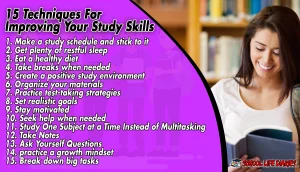Whether you’re a student just starting out in school or an experienced teacher imparting knowledge to your students, learning how to improve your study skills properly is essential for success in the classroom. Having strong study skills allows individuals to apply reading and writing strategies, along with practice exams and other useful techniques, that help them understand materials better and achieve impressive results.
In this blog post, we’ll go over some tips on how to improve your study skills no matter what level of education you’re looking to attain! Improving your study skills is essential for achieving academic success. Here are some simple steps that you can take to improve your focus and achieve better results:
15 Techniques For Improving Your Study Skills
1. Make a study schedule and stick to it:
The first step to acing any exam is to create a study schedule and stick to it. Determine how much time you need to spend on studying based on the difficulty of the material and how much time you have before the test. Create a schedule that includes breaks and stick to it as much as possible.
2. Get plenty of restful sleep:
It is important to get enough sleep when studying for an exam. Sleep helps the brain retain information and makes it easier to focus. Try to get at least eight hours of sleep each night. If you can, take regular naps during the day.
This will help to refresh your mind and make it easier to focus on studying. Make sure that your sleeping environment is comfortable and free of distractions such as television or loud music.
3. Eat a healthy diet:
Eating a healthy diet is important for focus and concentration. Make sure to eat plenty of fruits, vegetables, and whole grains. Avoid sugary and high-fat foods as they can make it difficult to concentrate.
Try to eat meals that are balanced and include foods from all the food groups. Get enough protein to keep your energy levels up throughout the day. And drink plenty of water to stay hydrated and alert.
4. Take breaks when needed:
It is important to take breaks when studying for an exam. Breaks help you clear your head and come back to the material refreshed. Try to take a break every hour or so. This could be as simple as getting up and walking around, doing jumping jacks, or even just stretching.
Make sure you’re taking breaks with a purpose don’t just sit in front of the TV. Use these brief moments to help you stay motivated and focused on your studies.
5. Create a positive study environment:
The environment you study in can impact how well you do on an exam. Make sure to study in a quiet place with plenty of light. Avoid studying in bed as it can make it difficult to fall asleep.
Organize your workspace so that all of the materials you need are accessible and easy to find. If possible, try to study with a friend or classmate in order to stay focused and accountable.
6. Organize your materials:
Organizing your study materials can help you make the most of your study time. Create a system that works for you and make sure to put all of your materials in one place. Keep track of the materials you use most frequently and set aside a designated space for studying. This will help ensure that all of your study resources are easily accessible when it’s time to hit the books.
7. Practice test-taking strategies:
In order to do well on an exam, it is important to practice test-taking strategies. Take practice papers under timed conditions to get a feel for how the exam will be. Make sure to read the questions carefully and answer them fully.
Practicing active listening will also help you remember the key points of a lecture or discussion. Make sure to review your answers and double-check them for accuracy.
8. Set realistic goals:
When studying for an exam, it is important to set realistic goals. Determine what you need to score on the exam and work towards that goal. Do not put too much pressure on yourself as it can lead to anxiety and poor performance.
Estimate how much time you need to study and stick to the plan. Break your study goals up into smaller achievable chunks so that you can measure your progress along the way. This will help keep you motivated and on track to reach your goal.
9. Stay motivated:
It is important to stay motivated when studying for an exam. Find a study buddy or join a study group to stay on track. Reward yourself for completing tasks on your schedule. Keep a positive attitude and remind yourself why you are taking the exam. Take breaks throughout your study sessions and reward yourself with activities that make you feel relaxed and energized.
10. Seek help when needed:
If you are struggling with the material, do not hesitate to seek help. Talk to your instructor or a tutor for assistance. There are also many online resources that can help you learn the material. With the right support, you will be able to understand and master any subject.
11. Study One Subject at a Time Instead of Multitasking:
When studying, it’s important to focus on one subject at a time instead of multitasking. This will help you to absorb the material and understand it in greater depth. It can also help to prevent distractions and improve concentration.
Studying one topic in isolation will make it easier to retain the information and recall it later on. If you find yourself feeling overwhelmed or distracted, take a break and focus on one subject at a time.
12. Take Notes:
Taking notes as you read can help you remember the important points of a lecture or textbook that are relevant to your current studies. It also helps to create an organized outline of the topics covered, enabling you to easily refer back to them later.
When taking notes, it is important to write down key ideas, concepts, and definitions in order to help you remember them better. Adding diagrams or visuals can be a helpful supplement to your notes when studying complex topics.
13. Ask Yourself Questions:
Asking yourself questions as you read can help you to better understand the material and also make sure that it is being retained for future reference. This will make revision easier when it comes time for exams or completing assignments.
Some useful questions to ask yourself as you read include: What is the author trying to say? How does this information relate to what I already know about the topic? What important points have been made so far in the text?
14. practice a growth mindset:
One of the best ways to improve your study skills is to practice a growth mindset. This means understanding that your abilities are not fixed and that with hard work and effort, you can achieve anything. When it comes to studying, this means developing strategies to help you become more productive and avoid procrastination.
15. Break down big tasks:
When you’re faced with a large task or assignment, break it down into smaller chunks that are easier to manage. You can even create a list of smaller steps to complete each one, and this will make the overall task less daunting.
It can help you to stay on track as you work through each step. As an added bonus, checking items off your list can be a great way to keep yourself motivated and reward yourself for completing tasks.
Related Article: What Are Study Skills? Tips and Techniques for Success
Conclusion: How To Improve Your Study Skills?
Improving your study skills can be easy when you have the right tools and tips to help guide you. Using these suggestions makes studying more efficient so that you can get the most out of your time spent in school. Tutoring is a great way to improve your study skills and get the help you need to succeed.
There are many resources available to both students and teachers. The best way to find out what works for you is to try different techniques and see what helps you learn the material better. No two people learn in the same way, so it’s important to find a method that works well for you.





